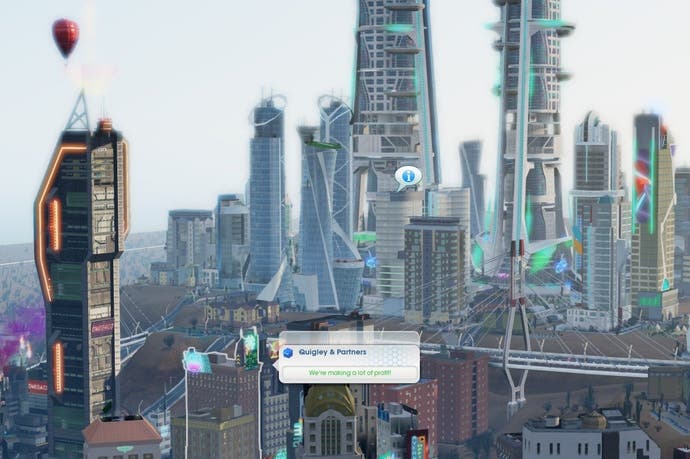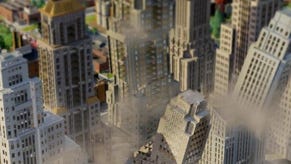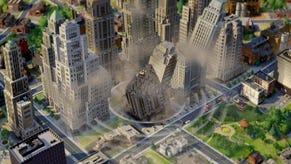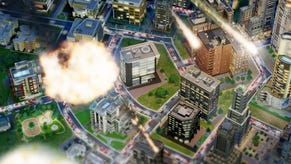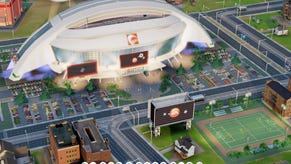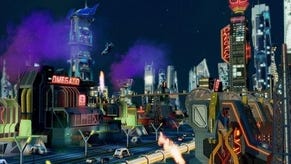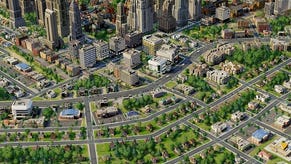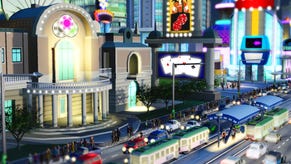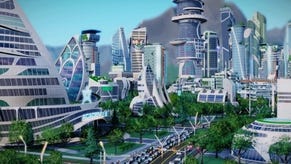Coming home? The return to SimCity
A year on from from its disastrous launch, our reviewer heads back to see what's changed.
Jefferson is gone. The first city that I ever built in the new SimCity, the one I laboured over for so many hours and led through redesign after redesign, is now no more. SimCity told me that there were problems with my city and that it needed to try and repair it. I could've told it that a year ago.
I suppose that it was a lost cause. Eventually, after attempting something called a "roll back" several times, Jefferson was lost to the void. I assume that, somewhere, EA's equivalent of a Death Star had opened fire, countless Sims cried out in terror and were suddenly silenced.
Time to start again.
Coming back to SimCity is a strange experience for me, much like a return home that you don't really want to face. In March 2013, I was very much looking forward to playing what appeared to be a finely crafted and quite beautiful computer game, a game that had repeatedly excited me during each of the busy, bustling previews I'd attended. The developers at Maxis had a long history of creating games that had made me very, very happy. Again and again they had won my affections and it was only as an adult, more than two decades after trying the first SimCity, that I realised how much I'd bought into their vision of the world and how much they'd connected with my ideals.
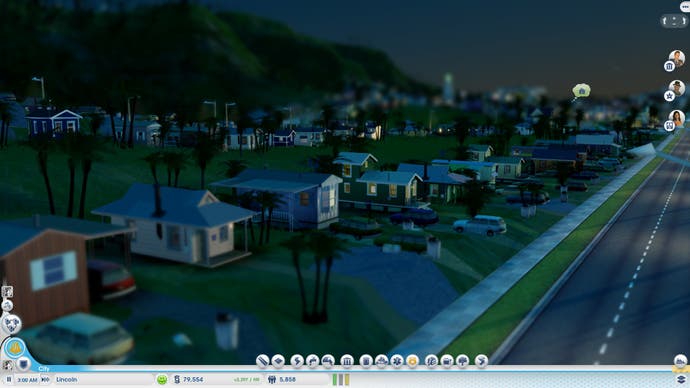
Maxis presented a vision of suburban utopia, of exactly the sort of life I wanted to live. The Sims and SimCity games were always about creating places where people had the freedom and opportunity to be what they wanted, where hard work was always rewarded, where there was space and sunshine and parks and prosperity and a home and happiness for everyone. Their worlds were fair and kind and bright and colourful. It wasn't so much the American dream as the American fantasy.
But that dream, that fantasy, was rudely dispelled. When the Cities of Tomorrow expansion arrived later that same year, it managed to sew up many of SimCity's tears, but it ripped some of its own and the game was still ragged, always blurting confused and contradictory feedback at you. Where there should have been that Maxis vision, that Maxis fairness that always rewarded you for your creativity and diligence, there was nonsense, incoherence.
Until this week, that was my last trip back to SimCity. This time around, a few more things have changed, but the same old neighbourhood is still familiar and a few welcome home gifts don't do much do dull my dismay. Apparently, SimCity tells me, I've downloaded the Attractions Set. I don't remember this, but perhaps it was a free expansion passed out sometime. It includes a few new tourist attractions - yet more things that will provide further revenue for my cities.
My cities really don't need revenue. While Jefferson might have been either swept under the carpet or simply carpet-bombed (I'm sure carpets were involved somehow), most of the other cities and regions I played with still seem to be up and running, each of them turning disgusting profits. The balance in a few of them seems to be quite alarmingly trapped in the red, but this isn't taking into account my export sales. One trick I learned very quickly was simply to recycle waste and then export the reconstituted materials, earning myself several tens of thousands of Simoleons for each truckload. I was (and still am) selling trash for cash. While that fits with Maxis' vision of greener futures, futures where we cherish our environment and where our technology is so tidy, it's a system that's all too easy to set up. Like a vomiting cash machine, it keeps hurling money at my feet.
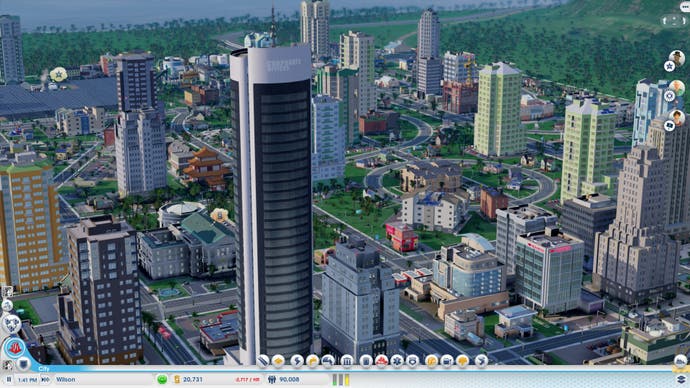
I start a new city and try to pull another old trick out of the hat, but this time SimCity is actually on to me. After a few minutes, it politely reminds me that nobody has a job. Aha! It understands now what unemployment is. What it doesn't seem to understand, though, is that real unemployed people won't stick around, won't continue to rent or live in high-value properties. Well, you're almost there, SimCity. Good effort.
Maxis is master of presentation and interface so, while the mechanics underneath might still be questionable, SimCity still swallows your seconds like a Basking Shark effortlessly gulping down thousands and thousands of tiny plankton. You click and you build and you drag and you design, hypnotised by the process, by its gentle guidance, by its beautiful feedback. Now you need a school. Now you need to expand your solar plant.
The pace of the game is measured but encouraging and you're urged on by new visual clues, you're swimming through the menus with ease, carefully selecting which of the many pretty parks you want to drop down next. It can be engrossing, but there's always another inconsistency, element or figure out of place, always something that will shake you free from the game's grip. A police officer tells you they can't keep up with the level of crime in the city. She asks you to provide more squad cars. You check the crime figures and they're almost at zero. There are no crimes.
The many hours I've put into SimCity have made me a more efficient city-builder, which means I plan better and I expand faster. I know I need to leave a little space around my town hall, a bit of room for the extra wings that it will grow in time. I spend less time rearranging roads and I'm sure to leave large plots for the utilities I'll need. All this means I'm so, so quickly running up against the limits of my city. The more you play SimCity, the more you realise how confined it is.
Large buildings like the stadium, airport and and expo centre should be exciting additions, but they become a nuisance. They're too big to fit anywhere or they necessitate a serious redesign, because their footprint is a not insignificant fraction of your land. This is offset somewhat by most of them gracing a whole region with their benefits, so once you've built one you can enjoy its effects everywhere, but it still means you run out of room too fast and you lose any sense that you're making something epic. I'm not making cities, I'm making towns.
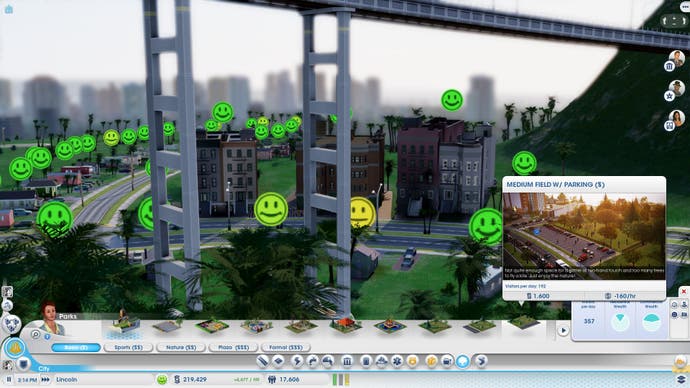
I still don't trust those towns to properly share with one another, either. Even in the new single-player, offline and entirely local mode, my towns don't always want to be the friends I tell them to be. I can't seem to import the water I so desperately need from the next town along, even though I've asked it to send some of its tremendous surplus. I can take a little solace from the fact that my citizens don't really care. The Sims of this SimCity may complain, but they're still there, they still pay their taxes.
I suppose there's still a particular sort of idealism present in SimCity, a knowledge that if you build it, they will come. It doesn't matter if it's broken, if it's dingy, if it's a rubbish town, that's still a promise you can hold on to. If you build it, the Sims will come and, come hell or high water, they'll pay their taxes. It's a very cynical thing that I'm still able to rely upon.
I want to believe. If I close my eyes, if I let the chirpy music seep into my ears, if I pan lazily over the tilt-shifted streets that light up so charmingly, so winningly when the sun goes down, then I can still just about make out that Californian confidence. I can't catch it, I can't hold it, but I know it's there. It's that optimism born of a developer whose games have always shown you that if you try to do good, if you try to make good things, then good things shall come.
It almost feels like SimCity grew up. Like it became pubescent and bitter and threw those values away, like it's snarling in your face and telling you you're a fool for even trying, for believing in all its beautiful, virtual Californias, for believing in the real California, for believing in anything like that.
"The world doesn't really work that way," it laughs. "The world isn't fair! Some things just don't make sense! Sometimes you try hard and it doesn't work out; you get nothing."
It points toward my transport network. 366 people are waiting for streetcars. I have never, ever installed streetcars anywhere in my city. Perhaps that's why the waiting time is zero minutes, and everybody seems quite satisfied.
